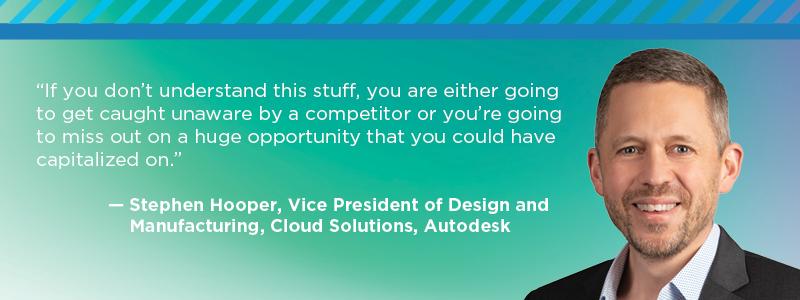& Construction

Integrated BIM tools, including Revit, AutoCAD, and Civil 3D
& Manufacturing

Professional CAD/CAM tools built on Inventor and AutoCAD
1 min read
The conversation addresses key industry concerns and highlights opportunities for consumer goods leaders in the future of manufacturing.
Scalable technologies have revolutionized the manufacturing of consumer goods by automating processes and reducing manual labor. For those companies yet to adopt these innovations, it begs the question: how can they project the worth of such investments and envision their future in manufacturing?
Stephen Hooper, the Vice President of design and manufacturing cloud solutions at Autodesk recently joined Consumer Goods Technology for a Virtual Fireside Chat to delve into this topic. During the chat, Hooper addresses key industry concerns and highlights the opportunities ripe for consumer goods leaders in relation to the future of manufacturing.

A majority of modern consumer products contain some type of software integration, and consumers desire continued connectivity to their products for additional services or updates that extend beyond the point of sale. How can companies keep up with demand? The discussion begins by addressing the increasing complexity of consumer products and the industry’s heavy reliance on systems modeling.
The rapid development of generative AI has increased competitive pressure. A common concern is that if competitors adopt these technologies quicker or are better positioned infrastructure-wise to leverage them, some may be driven out of business.
However, Hooper emphasizes that the goal is not to replace existing skills but to enhance them with AI. He suggests these technologies are the only viable solution to the existing skills gap in manufacturing. The challenge lies in learning how to utilize these tools for greater creativity and competitive advantage.

After addressing numerous industry concerns, Hooper offers insights into how companies can instead embrace these concerns as opportunities. For instance, he cites the use of AI in automating documentation creation—a process that consumes up to 21 hours weekly for many engineers—as an excellent opportunity to streamline a task that is not a good use of time.
Additionally, he offers advice for companies hoping to modernize their manufacturing processes. He advises communicating the benefits of these technologies in straightforward terms by explaining how they can make a job more engaging and productive and aid industry progression.
Visit Consumer Products Technology to listen to the full Fireside Chat.
By clicking subscribe, I agree to receive the Fusion newsletter and acknowledge the Autodesk Privacy Statement.
Success!
May we collect and use your data?
Learn more about the Third Party Services we use and our Privacy Statement.May we collect and use your data to tailor your experience?
Explore the benefits of a customized experience by managing your privacy settings for this site or visit our Privacy Statement to learn more about your options.